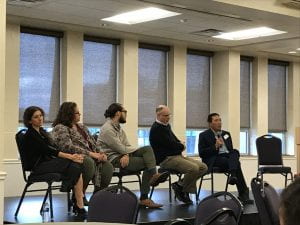
Panelists included: Levi Fuller, Faith in Action; Rachel Howdyshell, Open Doors; Shannon Porter, Mercy House; Rebecca Sprague, Church World Service Harrisonburg; Michael Wong, Harrisonburg Redevelopment & Housing Authority.
On Friday, February 7, 2020, more than 30 James Madison University students, faculty and staff, and community members participated in a “Hacking Housing Insecurity Summit” organized by Dr. Jamie Williams, Associate Director of Community Service-Learning and co-sponsored by the James Madison Center for Civic Engagement and Campus Compact. Local experts who grounded the day with history and local context included:
- Levi Fuller, Faith in Action
- Rachel Howdyshell, Open Doors
- Shannon Porter, Mercy House
- Rebecca Sprague, Church World Service Harrisonburg
- Michael Wong, Harrisonburg Redevelopment & Housing Authority
We’ll share some of the follow-up details from the summit, but here’s some quick takeaways and key facts shared by the panelists. Locally, wages have increased 6% since 2001, but housing costs have risen 21%, and the vacancy rate is only at about 2%. James Madison University hasn’t built enough housing to absorb increase in growth over the last decade and students have flooded the local housing market. This has led to three interrelated trends:
- JMU students are taking housing stock out of the community;
- There are higher standards to access existing housing; and
- Escalating rents.
Average rental cost of a one-bedroom apartment in Harrisonburg is around $870, but the survival budget for rent for someone in the Asset Limited Income Constrained but Employed (ALICE) population is only $637. And then there’s also a question of what’s available.
We need to make the case to JMU administration that this opportunity to be a national model and make Harrisonburg an even better community. JMU needs this community as much as this community needs JMU. Eastern Mennonite University has been opened to having conversations about how they can support this community on housing security and affordability.

Harrisonburg Housing Priorities Guide 2020. Full list of priorities available here.
During discussion, participants shared ideas that will be disseminated for follow-up. One of the first things needed however is research on how to address affordable housing and what best practices we can learn from other cities across the country.
Harrisonburg City Council will also hear an update from the City Manager, Mr. Eric Campbell, on February 11, 2020 about next steps the city is taking to address the issue, including a comprehensive study the current housing market, assess needs for different housing types and identify potential policy tools to address housing gaps.

Recent Comments